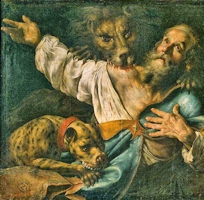HOMILY WEEK 28 04 – Year II
Chosen and Loved to be Saints:
Memorial of St. Ignatius of Antioch
(Eph 1:1-10; Ps 98; Lk 11:47-54)
***************************************
Here are some one-liners that fit the readings today: Some people are kind, polite, and sweet-spirited-until you try to sit in their pews; Many folks want to serve God, but only as advisers; It is easier to preach ten sermons than it is to live one; People are funny – they want the front of the bus, the middle of the road, and the back of the church.
The liturgy today offers us a simple, clear yet challenging message: We are chosen and loved by God to be saints, holy and blameless in God’s sight.
There are some United Nations statistics that remind us how special we are. 2012, it was announced that there were 7.2 billion people in the world. We await the next announcement, realizing that we are privileged to be one of those billions of people on the planet, yet individually loved by the creator of this universe.
The first reading adds depth to this specialness. Paul tells us (through the Ephesians) that we are chosen, loved, individually, totally, and unconditionally. We are adopted as children of God. Adoption is an amazing reality, as children born of other parents are taken as one’s own, including all the rights of inheritance of a biological son or daughter.
Paul adds that we are forgiven and redeemed by the blood of Jesus. St. Eugene de Mazenod, founder of the Oblates of Mary Immaculate, had a profound conversion experience at the foot of the cross on a Good Friday, as he truly realized for the first time how much God loved him in Jesus and how profoundly he was forgiven. Like St. Paul, that experienced changed his life and led to the founding of a religious order as well as becoming a bishop to serve the church, and especially the poor. One quip put it this way: The best mathematical equation is 1 cross + 3 nails = 4 given.
The Ephesians are a model for us in terms of response. St. Paul calls them saints. We are also called to be holy and blameless, to be saints. The advice that St. Eugene gave to his Oblate missionaries was to help people be first fully human, then Christians, and finally, to become saints.
In the end, we are called to do God’s will, not our own. Our first concern upon getting up in the morning should be, “What is God’s will for me this day?” Step 11 of the 12 Step program reads, “We sought, through prayer and meditation, to improve my conscious contact with God, seeking only the knowledge of God’s will for me, and the power to carry it out.” The late President John F. Kennedy put a similar challenge before the American people: “Ask not what your country can do for you; ask rather, what you can do for your country.”
The Pharisees Jesus confronted in the gospel today were just the opposite: full of false pride, hypocrisy, violence, lacking any compassion and focused only on externals. They were just the opposite of the Ephesians, and everything we should try to avoid in our own lives.

St. Ignatius of Antioch
Today the Church honours St. Ignatius of Antioch, bishop and martyr. Ignatius is believed to have been a convert to Christianity and a disciple of John the Evangelist. Bishop of Antioch for 40 years, he was arrested during the persecution under Trajan, condemned for confessing Christ and taken in chains to Rome. The ship in which he was sent travelled along the coast of Asia Minor and at every port crowds of Christians would greet him. While on his journey to his death, Ignatius dictated seven letters on the Church, now counted among the treasures of early Christianity. Ignatius arrived in Rome about the year 107 and was taken directly to the amphitheater, where lions devoured him.
Here is an excerpt from one of his letters, demonstrating his unflagging faith in Jesus Christ: “I am writing to all the churches to let it be known that I will gladly die for God if only you do not stand in my way. I plead with you: show me no untimely kindness. Let me be food for the wild beasts, for they are my way to God. I am God’s wheat and shall be ground by their teeth so that I may become Christ’s pure bread. Pray to Christ for me that the animals will be the means of making me a sacrificial victim for God.”
The Eucharist we celebrate now is what the saints of Ephesus celebrated with St. Paul – an agape, a meal shared in love as God’s new chosen people.
So, let us be grateful, appreciate how special and loved we are by God, and respond by living as saints, holy and blameless in God’s sight.



